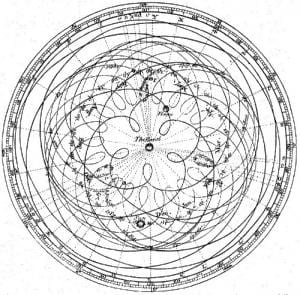Daniel K. Williams’ essay over on the Anxious Bench has me thinking of Ptolemy’s epicycles. Those were the little loop-de-loops and mathematically elegant pirouettes the ancient astronomer hypothesized to make a geocentric model of our solar system work.
 And Ptolemy did make it work, even though it wasn’t true. His math held up for more than a thousand years and the only reason we’re not still using it is because of a later revolutionary epiphany he had no basis for understanding.
And Ptolemy did make it work, even though it wasn’t true. His math held up for more than a thousand years and the only reason we’re not still using it is because of a later revolutionary epiphany he had no basis for understanding.
That epiphany — the Copernican revolution of recognizing that we’re just a planet, too, and that our planet isn’t the center of everything — is what’s missing in Williams’ essay. That’s immensely frustrating, making the experience of reading it a bit like reading a cutting-edge astronomy textbook from 1492. The piece works hard to describe and account for what seems apparent from one perspective, but never questions the fundamentally mistaken premise that this is the only possible perspective, and so it winds up tracing elaborate curlicues to sidestep the epiphany it seems determined to avoid.
That sidestepping starts with the assertion made in the title of Williams’ post: “How the Civil Rights Movement Converted Liberal White Protestants to Secularism.”
What in the name of Jonathan Daniels is that about?
Williams doesn’t argue that this “conversion” — or deconversion — to a “secular” religion and a “moral compass of rights consciousness” happened for Black Christians after the Civil Rights Movement. But he doesn’t explain — or perhaps even grasp — why he doesn’t argue that. I think it’s because the geocentric model doesn’t recognize that the Earth is a planet. Which is to say that Williams recognizes that there exists some distinct thing that can be described as Black Christianity, but does not recognize that there also exists some distinct thing that can be described as white Christianity. And so white Americans who begin to question, critique, or abandon white Christianity can only be described or understood as people leaving Christianity itself, because white Christianity is not one of several planets but the center around which everything else orbits.
Thus Williams recognizes that the Civil Rights Movement “was inspired by an African American Exodus theology that had been forged in the fires of a centuries-long experience of injustice” but seems unable to see that it arose in opposition to a white American Pharaoh theology that had been forged in the fires of a centuries-long commitment to injustice. And when white Protestants encountered what he accurately describes as “the 20th-century American Great Awakening known as the civil rights movement” he can perceive them only as being converted from Christianity itself rather than being converted from this white theology with all of its attendant doctrines of white soteriology, white hermeneutics, white epistemology, white ecclesiology, etc.
That’s the hardest part of the Copernican revolution — recognizing that the place we were born and the version of faith we were baptized into isn’t the unmovable center of everything and that the white theology we’ve always assumed was normative is just one more planet out of many.
Once we recognize that, then other, simpler explanations become available for all the data points and observations and apparent motions that Williams’ epicycling essay attempts to account for — from the late-20th century decline of mainline [white] Protestant denominations to the rejection of white theology’s unjust morality even among secular academics.
But while Williams’ essay comes tantalizingly close to that Copernican epiphany, his conclusion makes one last recursive loop back to geocentrism:
Perhaps what the white progressives needed to experience in the civil rights era of the 1960s was not conversion, but repentance. And perhaps if they had, they would have returned to their churches with a humble determination to learn from African American Christians, renounce their past blindness, fight structural racism, and show love and mercy toward those in their own churches whose perspective might differ. But without Christ, that grace was lacking. And so today, a half century later, we are left with the polarizing conflict between white Christian conservatives who don’t understand the conversion that others experienced on the road to Selma and white secular liberals who don’t understand how the conservatives could remain so blind.
It’s pointless to speak of “a humble determination to learn from African American Christians” while still insisting that white Christianity is normative — the most “conservative” and therefore the most legitimate form of Christianity. Perhaps this unrepentant “conservative Christianity” needs a few tweaks and epicycles to account for its retrograde ethics, but its place at the center of the universe cannot be questioned.












